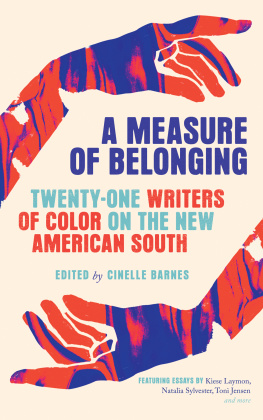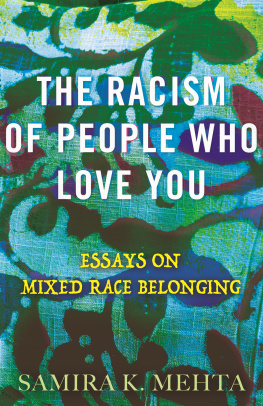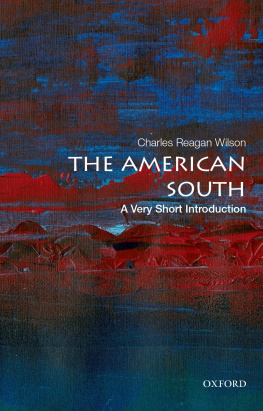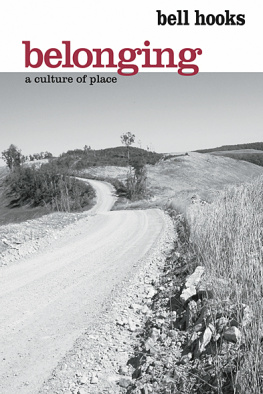Table of Contents
Guide
Page List

A MEASURE OF BELONGING

Copyright 2020
Cinelle Barnes
All rights reserved. No part of this book may be reproduced in any form or by any electronic means, including information storage and retrieval systems, without permission in writing from the publisher, except by a reviewer, who may quote brief passages in a review.
BOOK DESIGN: Meg Reid, Kate McMullen
COVER ILLUSTRATION: John Mata
COPY EDITOR: Annie Crandell
PROOFREADERS: Jacquelyn Lancaster, Amanda L. Rosa, Kendall Owens
Library of Congress Cataloging-in-Publication Data
Barnes, Cinelle, editor.
A measure of belonging : twenty-one writers of color on the new American South / edited by Cinelle Barnes.
Spartanburg, SC : Hub City Press, [2020]
LCCN 2020029995 | ISBN 9781938235719 (trade paperback)
ISBN 9781938235719 (ebook)
Subjects: LCSH:
American literatureMinority authors.
MinoritiesLiterary collections.
Southern StatesLiterary collections.
MinoritiesSouthern StatesCivilization.
Classification:
LCC PS508.M54 M43 2020
DDC 810.9/896075dc23
LC record available at https://lccn.loc.gov/2020029995
Manufactured in the United States of America
First Edition
HUB CITY PRESS
200 Ezell Street
Spartanburg, SC 29306
864.577.9349 | www.hubcity.org
Contents

TEN YEARS AGO, I FELL IN LOVE WITH A BOY FROM the Carolinas and followed him south, leaving the expansiveness of New York City for a small city on the Atlantic, a locale known for its food, its shadowed history, and its proud architecture. In spite of its ambitions and influence, the city still felt small to me in more ways than size.
Young and new to town, I nevertheless stepped out eager to receive all this new place would offer. On the night of my loves employee welcome dinner, I sat among wives of other transplants and wives of long-time staff. In the air-conditioned cafeteria where we escaped the August heat, wives fanned themselves with cloth napkins. I sweated in that room, tempted to dab my neck with my napkin. We had linens but ate off paper plates. I didnt know whether to relax or sit up straight. The manicured-casual way of dress didnt give any hints as to how I should behave. At this place of work, most people stayed until retirement. In fact, my new husband and I sat next to a sexagenarian couple whod been with the employer for nearly a decade. I considered it a good sign: people loved to work there, they never left.
Right?
When the men got up to get drinks, the wife turned to me and stopped me mid-bite. So, how do you like it here? she said.
I told her that I loved the weather, the beaches, and historic downtown. But the part of me that had pursued a degree in journalism and literatureand was determined to practice what I was taughttold her the whole truth. Remembering how insular the city felt and how I stuck out without having to try, I said, But there are definitely things I would change.
Honey, nobody asked you to move here, the woman said. And that was all. She finished her meal, pushed her chair back, slapped her cloth napkin on the table, left, and never spoke to me again in the years that our husbands shared a place of work.
It was not that I wanted or needed to be asked to come somewhere or be a part of something. It was that I was told to my face, at a welcome dinner, by someone who could have been more than a stranger, that I was not, in fact, invited. The dismissal I felt that night would be felt again throughout the decade Ive spent in the South.
I came of age in New York City, an undocumented immigrant from the Philippines. I had been adopted into Long Island; but when my citizenship petition fell through due to my age (too old to be naturalized through adoption yet too young to be on a work visa), I fell out-of-status. Life became more challenging than what was promised by my adoptive mother. But still, a way was made for me. I was allowed an education from one of the citys sanctuary schools. From there, I had entry-level jobs and internships that launched me toward a career in journalism and the arts. I was given a hand up by people of various backgrounds and at different stations: lawyers and restaurant managers I worked for, relatives and friends who shared their resources, and teachers and mentors who offered wisdom and knowledge.
Their confidence (read: lack of mistrust or fear) in me permitted interactions and commissions I would not have otherwise had access to as someone deemed illegal by a government. So, you can imagine what they all said when I announced that I had met a boy and was moving south because, well, being undocumented had been so wearisome and worrisome and it was nice to love and be loved, to be and feel young.
They warned me: There is nothing for you there. Youre gonna turn right back around.
Still, I moved.
In these ten years, I have published several essays and two books. I have gone on a cross-country book tour. I have spoken in front of audiences. This was not the life I foresaw for myself in the wake of the encounter at dinner. I had been convinced there were going to be unnatural yet obvious barriers to my mobility and achievement as a woman of color in the South. In these ten years, I have had interactions, been privy to conversations, and encountered institutions (tangible and not) that could have led me to believe what my former employers, friends, relatives, teachers, and mentors told me way back when. There is nothing for you there. Youre gonna turn right back around.
I havent turned back around. Instead, Ive committed myself to making this place as big as it actually is. Because small is so ten years ago. Small is that woman who called me Honey. Small is the South that saves its best smiles, best hey yalls, and best resources to perpetuate a cultural homogeneity. And small are the books about this region that refuse to acknowledge and celebrate the voices and narratives of honey-me, honey-she, honey-he, honey-they, and honey-you.
And no, there is not nothing for me here. And there is not nothing for other people of color. There is not nothing for readers like you. There is this book, this anthology. There are the established and emerging writers herein who not only have, but share. While their stories and styles differperhaps more so than even I anticipateda truth they share is that like most in their generation, they never bought into the lie that they did not belong here. These essayists know how to take up space and make space, in the way that only millennials and Gen-Xers know and zealously practice.
This is a collection of stories that say, Honey, you come right here and sit up next to me. In Minda Honeys essay, she asks us to sit right up next to her on a stoop and listen to tales of generational hurt and hope. Andrew Carnegie medalist Kiese Laymon invites us to step into a recording studio and the mind of a Black man in Mississippi; Christena Cleveland asks us to hear conversations in academia and on Southeastern college sports. Joy Priest swings open her car door, takes us for a ride in her Cutty, turns up the volume on her radio, and makes us feel all the times shes felt young and all the times shes felt so old.








